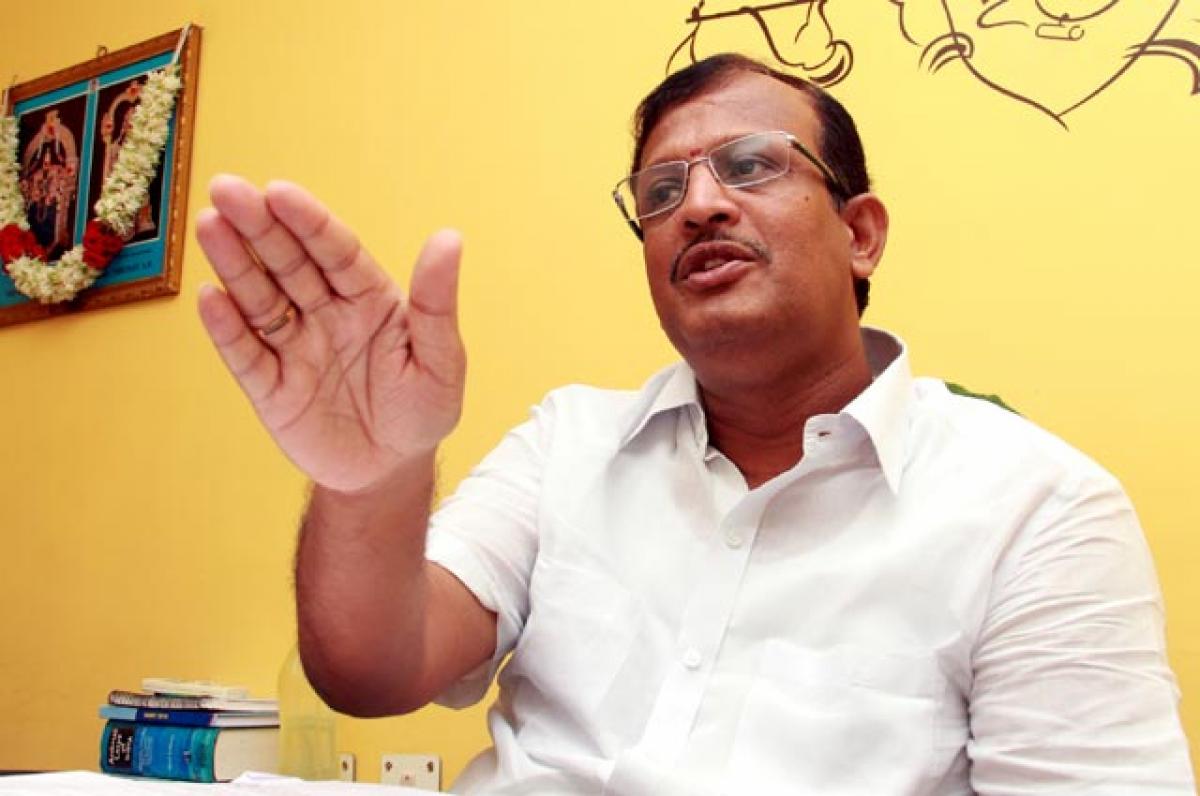Live
- China maintains yellow alerts for blizzards, cold waves
- Japan's Yamanashi plans to raise entry fee for Mount Fuji climbers
- Convert those starts: Hemp wants Bangladesh batters to score big in second Test vs West Indies
- OpenAI signs 1st MoU in South Korea to foster AI ecosystem
- Fire breaks out during rocket test at Japan's space centre
- Nigerian military kills more suspected terrorists in Lake Chad Basin airstrikes
- NABL signs pact for on-site testing of materials in construction projects
- Cantonment MLA Sri Ganesh Advocates for New RTO Office Amid Road Expansion Concerns
- UN humanitarian chief meets Sudan's Al-Burhan to address aid crisis
- Zimbabwean president calls for international support to resolve debt issues
Just In

The TTDs SV Gosamrakshana Sala (SVGS) here sheltering about 2500 cattle mostly donated by public is plagued with a plethora of problems.
Works of proposed new farm at Palamaner put on backburner
Tirupati: The TTDs SV Gosamrakshana Sala (SVGS) here sheltering about 2500 cattle mostly donated by public is plagued with a plethora of problems. The TTD management’s apathy coupled with red tape is proving to be a curse on the farm house located on a 65 acre site near Tummalagunta on the town outskirts where about 2500 cows including bull calves, 8 elephants, 16 bulls (displayed during temple festivals) 26 horses including 16 ponies and 80 deer are being sheltered.
The main problem coming in the way of proper care of the cattle was inadequate shelter and insufficient staff. When the dairy farm was started in 1956, it was on a sprawling 400 acre site housing a hundred and fifty cows mostly milch animals but after TTD gave away 335 acre land to government for setting of Sri Padmavathi Mahila Viswa Vidyalayam (SPMVV) has shrunk to 65 acres. Now only a limited space was left for grazing area and moving space for the huge number of animals with considerable area being used for office, staff quarters and internal roads.
Though, the TTD proposed a state of the art 450 acre gosala in Palamaner the development works are at a slow pace. Apart from the space crunch, the SVGS is also facing severe water problem. Out of the 14 borewells, 13 have dried up as colonies have come up in the area. Another major problem hitting the SVGS hard is inadequate staff which remained static at 260 for past four years when the animal strength was only 1200.
Interestingly, when the whole nation is looking up at TTD as saviour of the holy cow, as the biggest and resourceful religious Hindu institution, there is no separate committee with powers to oversee SVGS resulting in the overburdening of TTD officials who are unable to take care of requirements like providing additional shelter, water and other facilities, as they are burdened with pilgrims, VVIP visits.
What is more irking is the process is that any proposal to improve facilities at SVGS has to go through the long and cumbersome process involving many departments in TTD which adds to delay in decisions. While the bitter truth was that the SVGS issues may not get urgent attention like other focal points or issues preventing the efficient functioning of SVGS in a professional way.
Talking to The Hans, SVGS director K Haranatha Reddy said that efforts are on for construction of more sheds to cope with the increase in the cattle population. He said that the permanent solution to resolve congestion of SVGS is shifting of part of cattle to Palamaner after necessary facilities were created on priority basis.
Reddy maintained that the cattle and other animals are well fed which he said was evident with the death rate far below the norm set by the government. The death rate which was 3.11 percent 2014-15 came down to 2.08 in 2015-16 against 14 per cent norm which testifies the best care of the animals in SVGS. Further, culling of animals which was an established practice in government and veterinary and agriculture university run farms could not be allowed in SVGS, run by a Hindu religious trust.
About some of the cattle looking weak, he said that a good number of cattle donated by the public are aged, debilitated and diseased which cannot be refused to respect the sentiment of the devotees. After receiving the donated animals, we are providing medical treatment, but due to some chronic ailments these animals were unable recover, he explained.
In this connection he said that the SVGS facing the problem of shortage of veterinary doctors with four of six doctors recently appointed left leaving only two apart from the director and assistant director and a half dozen compounders to look after about 3000 animals including the 380 deer in the park at 7th mile on the way to Tirumala hills. The gosala is spending about Rs 4.8 crore on feeding the animals including feed, straw and green grass, maize and maintained that they were providing adequate nutrition for the animals.
By G Sridhar

© 2024 Hyderabad Media House Limited/The Hans India. All rights reserved. Powered by hocalwire.com







